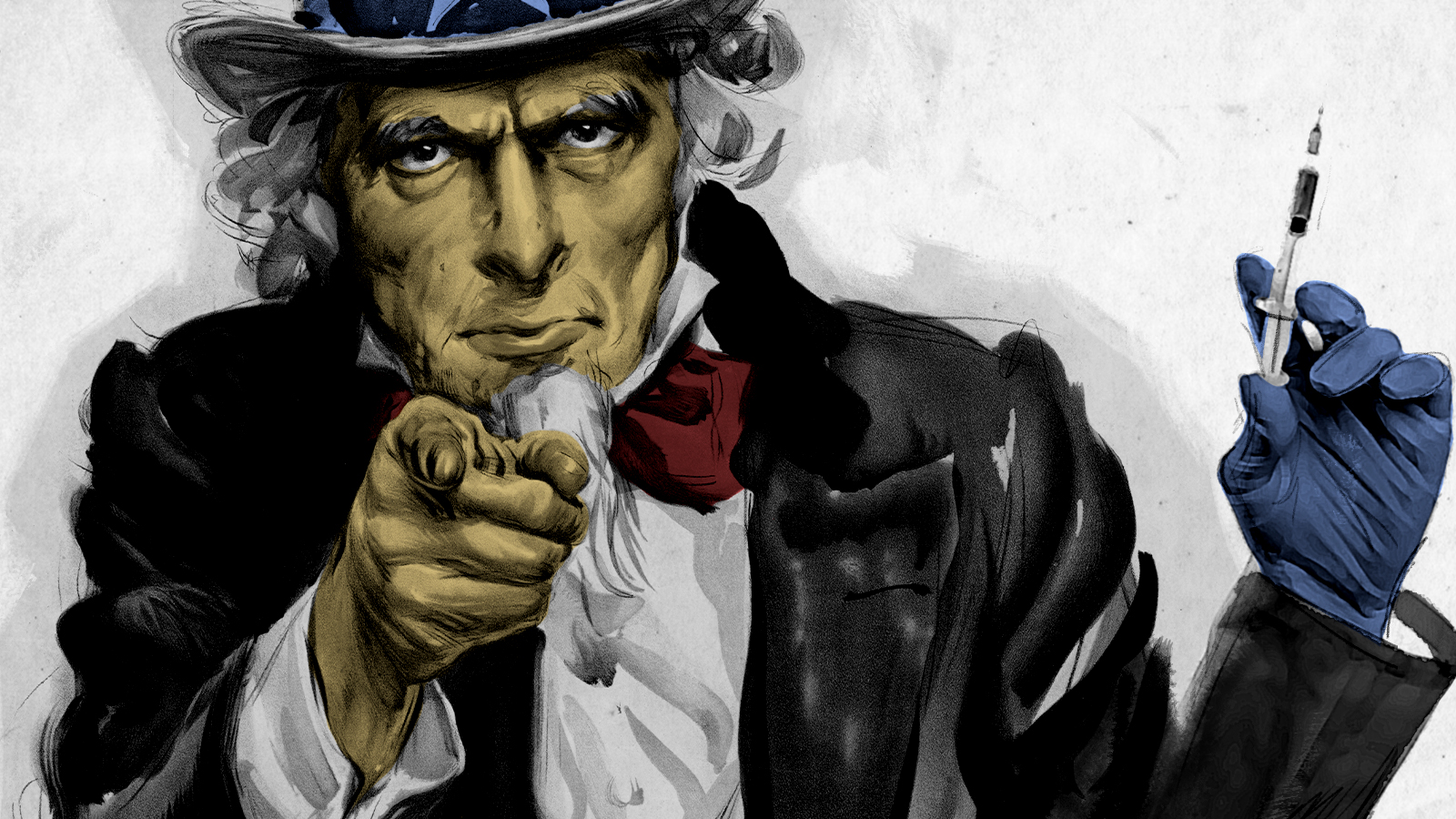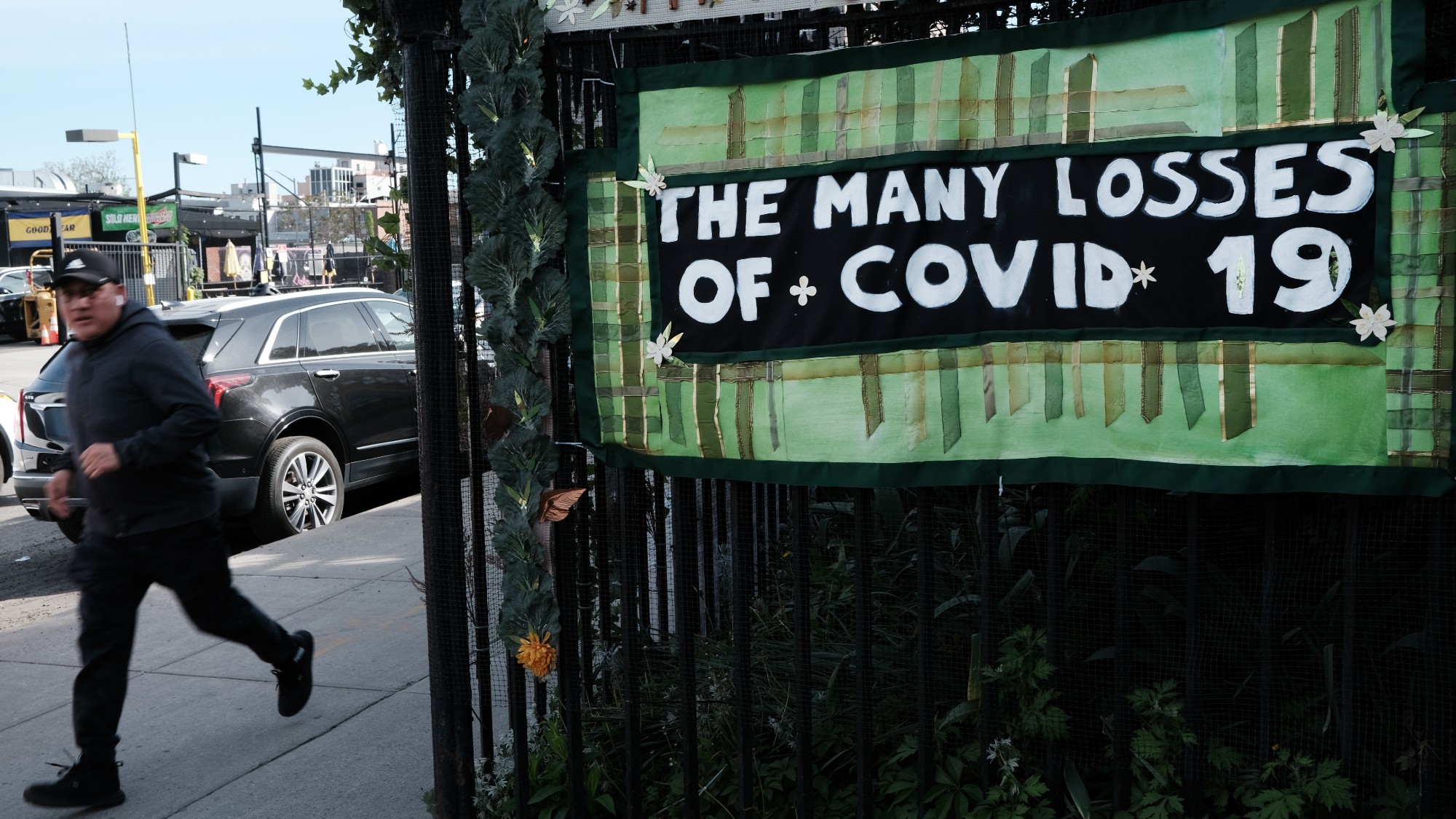There's 1 obvious solution to the Delta variant: Mandatory vaccination
Want to fly or go out to eat? Get your shot.


A free daily email with the biggest news stories of the day – and the best features from TheWeek.com
You are now subscribed
Your newsletter sign-up was successful
The coronavirus pandemic is back in America. Just as many feared, the Delta variant has proved to be extremely contagious, and cases are skyrocketing around the country — up 171 percent nationally over the last two weeks, at time of writing.
Worse, in many states well over half the population has not been vaccinated. (Despite a huge head start, the U.S. is now less vaccinated than Denmark, Spain, Italy, and Germany, and other countries are catching up fast.) In heavily-dosed states like Vermont and New Jersey, cases are up considerably, but hospitalizations much less so, because while the vaccines work less well against the Delta strain, they are still nearly 100-percent effective at preventing serious illness. But in conservative states full of Tucker Carlson-addled vaccine refuseniks, cases are skyrocketing and so are hospitalizations — and mass deaths are on the way. "I'm admitting young healthy people to the hospital with very serious COVID infections," one Alabama doctor wrote on Facebook recently. "One of the last things they do before they're intubated is beg me for the vaccine. I hold their hand and tell them that I'm sorry, but it's too late."
There is a simple and obvious solution to this problem: mandatory vaccination. Wherever possible, so long as people do not have a legitimate medical reason (such as allergies to other vaccines), they should be required to get their shot.
The Week
Escape your echo chamber. Get the facts behind the news, plus analysis from multiple perspectives.

Sign up for The Week's Free Newsletters
From our morning news briefing to a weekly Good News Newsletter, get the best of The Week delivered directly to your inbox.
From our morning news briefing to a weekly Good News Newsletter, get the best of The Week delivered directly to your inbox.
On civil liberties grounds, the case for requiring vaccination is ironclad. Even libertarian philosophers like Robert Nozick admit that the government can coerce people to prevent injury to others. The argument for strict measures to halt the spread of a super-contagious and extremely dangerous virus is essentially the same as for laws against murder.
Moreover, the coronavirus vaccines are one of the most-studied treatments in the history of medicine. They are extremely safe for virtually everyone, and again, aside from people with rare vaccine-specific allergies, they are far, far less dangerous than getting COVID. Full FDA approval is simply a matter of jumping through the tedious bureaucratic hoops, and it is a foregone conclusion (hopefully happening soon).
There is also a long history of mandatory vaccination in the United States and other countries. Many states imposed smallpox vaccination requirements to stem outbreaks in the 19th century, and the Supreme Court eventually ruled in 1905 that doing so is constitutional.
Now, it would probably not be possible at this point to actually go door-to-door and force people to get vaccinated. The American government barely knows where everyone lives. But there are a lot of other measures that could be taken in both the private and public sectors.
A free daily email with the biggest news stories of the day – and the best features from TheWeek.com
For instance, private businesses should require proof of vaccination (or a medical note explaining why someone can't get it) to use their services. A bunch of conservative states have actually passed laws forbidding businesses from doing this, but this is almost certainly an unconstitutional infringement of property rights. This development is quite ironic, as in ages past conservatives furiously attacked laws like the Civil Rights Act (witness Barry Goldwater in 1964 or Rand Paul in 2010) as being an infringement of personal liberty and property rights. Now, as my colleague Bonnie Kristian points out, they are doing the exact same infringement except not on behalf of an oppressed group, but on behalf of a deadly virus.
Legally speaking, civil rights laws only apply to discrimination against protected categories like race, gender, religion, and so on — you can still require people to wear clothing in a restaurant, for example, or throw an abusive drunk out of your bar. If you can do that you can certainly require customers to be vaccinated during a raging pandemic so they do not kill you, your employees, or other customers. Airlines would be especially effective here, since people have returned to traveling in large numbers, and there are not many options for flying.
Health-care workers are another obvious category of people who have no excuse to not get their shot, since they are routinely interacting with the public in a medical setting. Some private and public hospitals have required vaccination, and others are reportedly mulling the idea. Similarly, as Talking Points Memo's Josh Marshall argues, any objection about personal choice is even weaker with regard to cops, since part of their job is forcing people to interact with them. The NYPD, for example, has a pathetic 43 percent vaccination rate, probably because it is full of right-wing cranks. In general, every government employee of any kind should be required to be vaccinated to come to work. (San Francisco is reportedly implementing this rule for city employees.)
Some other institutions are having similar ideas as they look down the barrel of another viral wave. Both France and Israel have imposed vaccination requirements for their populations to be able to enter public buildings. The NFL recently announced stiff penalties for teams that end up missing a game due to illness among unvaccinated players or staff. Indiana University won a lawsuit challenging their requirement that students get vaccinated before returning to campus this year. Even Fox News has changed its tune somewhat with a new PSA urging its viewers to get their shots (though Carlson continues to spew anti-vaccine lies).
A surge of completely unnecessary illness and death in the U.S. is unavoidable at this point, but perhaps it will inspire various institutions to stop indulging anti-vaccine nuts.
Ryan Cooper is a national correspondent at TheWeek.com. His work has appeared in the Washington Monthly, The New Republic, and the Washington Post.
-
 The broken water companies failing England and Wales
The broken water companies failing England and WalesExplainer With rising bills, deteriorating river health and a lack of investment, regulators face an uphill battle to stabilise the industry
-
 A thrilling foodie city in northern Japan
A thrilling foodie city in northern JapanThe Week Recommends The food scene here is ‘unspoilt’ and ‘fun’
-
 Are AI bots conspiring against us?
Are AI bots conspiring against us?Talking Point Moltbook, the AI social network where humans are banned, may be the tip of the iceberg
-
 The billionaires’ wealth tax: a catastrophe for California?
The billionaires’ wealth tax: a catastrophe for California?Talking Point Peter Thiel and Larry Page preparing to change state residency
-
 Bari Weiss’ ‘60 Minutes’ scandal is about more than one report
Bari Weiss’ ‘60 Minutes’ scandal is about more than one reportIN THE SPOTLIGHT By blocking an approved segment on a controversial prison holding US deportees in El Salvador, the editor-in-chief of CBS News has become the main story
-
 Has Zohran Mamdani shown the Democrats how to win again?
Has Zohran Mamdani shown the Democrats how to win again?Today’s Big Question New York City mayoral election touted as victory for left-wing populists but moderate centrist wins elsewhere present more complex path for Democratic Party
-
 Millions turn out for anti-Trump ‘No Kings’ rallies
Millions turn out for anti-Trump ‘No Kings’ ralliesSpeed Read An estimated 7 million people participated, 2 million more than at the first ‘No Kings’ protest in June
-
 Ghislaine Maxwell: angling for a Trump pardon
Ghislaine Maxwell: angling for a Trump pardonTalking Point Convicted sex trafficker's testimony could shed new light on president's links to Jeffrey Epstein
-
 The last words and final moments of 40 presidents
The last words and final moments of 40 presidentsThe Explainer Some are eloquent quotes worthy of the holders of the highest office in the nation, and others... aren't
-
 The JFK files: the truth at last?
The JFK files: the truth at last?In The Spotlight More than 64,000 previously classified documents relating the 1963 assassination of John F. Kennedy have been released by the Trump administration
-
 'There is a certain kind of strength in refusing to concede error'
'There is a certain kind of strength in refusing to concede error'instant opinion 'Opinion, comment and editorials of the day'
